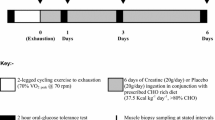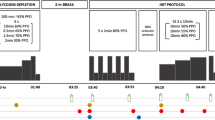Summary
The effect of altering muscle glycogen on the ability of skeletal muscle to generate voluntary and electrically evoked isometric force following prolonged exercise has been investigated in five healthy male subjects. Measurements from the triceps surae were made at rest, and before and after prolonged exercise (uphill walking) at approximately 75%\(\dot V_{{\text{O}}_{\text{2}} {\text{ max}}}\) in low muscle glycogen (low CHO) and high muscle glycogen (high CHO) conditions.
The results showed that before exercise there was no change in maximal twitch tension (\({\text{P}}_{{\text{t}}_{\text{o}} }\)), maximal tetanic tension at frequencies of 10 (Po10), 20 (Po20) and 50 Hz (Po50), and maximal voluntary contraction (MVC) in low and high CHO compared with normal. The loss of force during a 2 min electrically evoked “fatigue test” at rest was found to be higher (p<0.05) in low CHO and lower (p<0.05) in high CHO than normal.
Following the prolonged exercise, muscle weakness was produced in both low and high CHO conditions, but was found to be significantly greater in the low CHO condition for the measurements of Po10 (p<0.01), Po20 (p<0.05) and MVC (p<0.05).
It is concluded that changes in muscle glycogen alone do not alter the isometric force generating capacity of human muscle, but when combined with prolonged exercise low muscle glycogen enhances exercise-induced muscle weakness.
Similar content being viewed by others
References
Ahlborg B, Bergström J, Brohult J, Ekelund L-G, Hultman E, Maschio G (1967) Human muscle glycogen content and capacity for prolonged exercise after different diets. Forsvars-medicin 3: 85–89
Bergström J, Hultman E (1966) Muscle glycogen synthesis after exercise: an enhancing factor localized to the muscle cells in man. Nature 210: 309–310
Bergström J, Hultman E (1967) A study of glycogen metabolism during exercise in man. Scand J Clin Lab Invest 19: 218–228
Bergström J, Hermansen L, Hultman E, Saltin B (1967) Diet, muscle glycogen and physical performance. Acta Physiol Scand 71: 140–150
Bloom WL, Azar GJ (1963) Similarities of carbohydrate deficiency and fasting. I. Weight loss, electrolyte excretion and fatigue. Arch Intern Med 112: 333–337
Davies CTM (1968) Limitations to the prediction of maximum oxygen intake from cardiac frequency measurements. J Appl Physiol 24: 700–706
Davies CTM, White MJ (1982) Muscle weakness following dynamic exercise in humans. J Appl Physiol 53: 236–241
Davies CTM, Mecrow IK, White MJ (1982) Contractile properties of the human triceps surae with some observations on the effects of temperature and exercise. Eur J Appl Physiol 49: 255–269
Gollnick PD, Piehl K, Saubert CW, Armstrong RB, Saltin B (1972) Diet, exercise and glycogen changes in human muscle fibres. J Appl Physiol 33: 421–425
Gollnick PD, Piehl K, Saltin B (1974) Selective glycogen depletion pattern in human muscle fibres after exercise of varying intensity and at varying pedalling rates. J Physiol 241: 45–57
Hepburn D, Maughan RJ (1982) Glycogen availability as a limiting factor in the performance of isometric exercise. J Physiol 325: 52–53P
Hultman E, Sjöholm H, Sahlin K, Edström L (1981) Glycolytic and oxidative energy metabolism and contraction characteristics of intact human muscle. In: Human muscle fatigue: Physiological mechanisms. [Ciba Foundation Symposium 82]. Pitman Medical, London, pp 19–40
Jacobs I, Kaiser P, Tesch P (1981) Muscle strength and fatigue after selective glycogen depletion in human skeletal muscle fibres. Eur J Appl Physiol 46: 47–53
Maughan RJ (1982) A simple, rapid method for the determination of glucose, lactate, pyruvate, alanine, 3-hydroxybutyrate and acetoacetate on a single 20 mΜl blood sample. Clin Chim Acta 122: 231–240
Maughan RJ, Williams C, Campbell DM, Hepburn D (1978) Fat and carbohydrate metabolism during low intensity exercise: effects of the availability of muscle glycogen. Eur J Appl Physiol 39: 7–16
McCance RA, Widdowson E (1960) Composition of foods. MRC Special Report Series, HMSO, London
Olsson K-E, Saltin B (1970) Variations in total body water and muscle glycogen changes in man. Acta Physiol Scand 80: 11–18
Piehl K (1974) Glycogen storage and depletion in human skeletal muscle fibres. Acta Physiol Scand [Suppl] 402: 3–33
Saltin B, Karlsson J (1971) Muscle glycogen utilization during work of different intensities. Adv Exp Med Biol 11: 289–299
Secher NH, Nygaard Jensen E (1976) Glycogen depletion pattern in types I. IIA and IIB muscle fibres during maximal voluntary static and dynamic exercise. Acta Physiol Scand [Suppl] 440: 174
Thomson JA, Green HJ, Houston ME (1979) Muscle glycogen depletion patterns in fast twitch fibre subgroups of man during submaximal and supramaximal exercise. Pflügers Arch 379: 105–108
Author information
Authors and Affiliations
Rights and permissions
About this article
Cite this article
Young, K., Davies, C.T.M. Effect of diet on human muscle weakness following prolonged exercise. Europ. J. Appl. Physiol. 53, 81–85 (1984). https://doi.org/10.1007/BF00964695
Accepted:
Issue Date:
DOI: https://doi.org/10.1007/BF00964695




